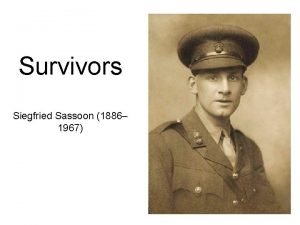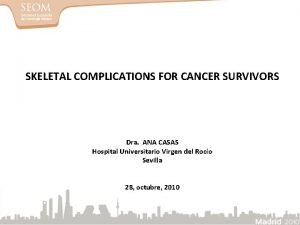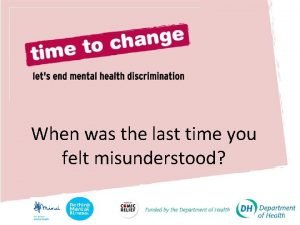Survivors Write How do you imagine survivors felt








- Slides: 8

Survivors

Write: • How do you imagine survivors felt after learning they were liberated? • What do you imagine some of their fears were? • The phrase “Return to Life” is often used in connection with the period immediately following liberation. What do you think were the first things the survivors needed in order to “Return to Life”?

Watch: • Go to Echoesand. Reflections. org • Click on “Lessons” then “Lesson Components” • Click on the plus sign next to Lesson 8 • Watch the video clips under Dennis Urstein, Henry Mikols, and David Abrams

Answer: • How does Dennis Urstein describe conditions in the Dachau prior to liberation? • What does Dennis remember about the day of liberation and the days immediately following? • Dennis mentions that the American soldiers reminded him of a character from his childhood. What is the significance of this memory? • What conflicting emotions does Dennis explain he felt after learning he was free?

Answer: • What does Henry Mikols remember of the liberation of Bergen-Belsen? • Henry says that he remembers feeling that maybe he was one of “the chosen ones. ” Do you think this was a common feeling among survivors? How might a feeling like that carry with it a tremendous responsibility in the minds of survivors? • What other emotions do you think survivors probably experienced after liberation?

Answer: • Who does David Abrams say he found upon arriving home? • Why do you think David wanted to walk up to his house rather than accept the ride that was offered to him? What do you think the walk symbolized for him?

Read and Answer: • Read The Tenth Man on my webpage • Answer: • What is the general tone of this piece? How did you feel reading it? • What is theme of this short story and how is it conveyed? • What is the significance of the lack of face for Chaim the carpenter and other returnees? • Why don’t most of the returnees enter their homes, but remain instead on the threshold? • Does the narrator claim that these Jews—individually and as a community—can return to life in this place? Explain how Ida Fink develops the narrator’s point of view over the course of the text.

Read and Answer: • Read Holocaust 1944 and When It Happened • Answer the following questions on each poem: • Who is the speaker in the poem? To whom is the speaker speaking? What is their relationship to one another? • Describe what you think the speaker’s experience might have been. • What emotions is the speaker experiencing? What do you think might be causing these emotions? • How did the progression of stanzas include increasing degrees of the speaker’s recognition of what was going on? How do these changing degrees of recognition seem to impact the poet’s sense of self? • What is theme of the poem? Pick one line or stanza in the poem that you believe contributed significantly to theme of the poem and explain why you selected this particular line or stanza. • What do you think the poet’s motivation was for writing this poem?















